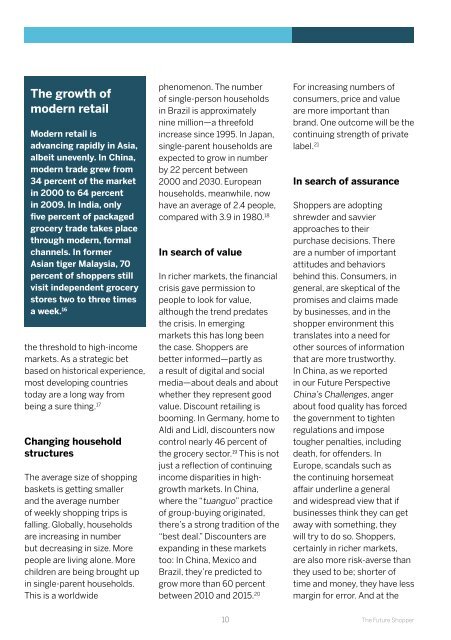how-changing-shopper-attitudes-and-technology-are-reshaping-retail
how-changing-shopper-attitudes-and-technology-are-reshaping-retail
how-changing-shopper-attitudes-and-technology-are-reshaping-retail
Create successful ePaper yourself
Turn your PDF publications into a flip-book with our unique Google optimized e-Paper software.
The growth of<br />
modern <strong>retail</strong><br />
Modern <strong>retail</strong> is<br />
advancing rapidly in Asia,<br />
albeit unevenly. In China,<br />
modern trade grew from<br />
34 percent of the market<br />
in 2000 to 64 percent<br />
in 2009. In India, only<br />
five percent of packaged<br />
grocery trade takes place<br />
through modern, formal<br />
channels. In former<br />
Asian tiger Malaysia, 70<br />
percent of <strong>shopper</strong>s still<br />
visit independent grocery<br />
stores two to three times<br />
a week. 16<br />
the threshold to high-income<br />
markets. As a strategic bet<br />
based on historical experience,<br />
most developing countries<br />
today <strong>are</strong> a long way from<br />
being a sure thing. 17<br />
Changing household<br />
structures<br />
The average size of shopping<br />
baskets is getting smaller<br />
<strong>and</strong> the average number<br />
of weekly shopping trips is<br />
falling. Globally, households<br />
<strong>are</strong> increasing in number<br />
but decreasing in size. More<br />
people <strong>are</strong> living alone. More<br />
children <strong>are</strong> being brought up<br />
in single-p<strong>are</strong>nt households.<br />
This is a worldwide<br />
phenomenon. The number<br />
of single-person households<br />
in Brazil is approximately<br />
nine million—a threefold<br />
increase since 1995. In Japan,<br />
single-p<strong>are</strong>nt households <strong>are</strong><br />
expected to grow in number<br />
by 22 percent between<br />
2000 <strong>and</strong> 2030. European<br />
households, meanwhile, now<br />
have an average of 2.4 people,<br />
comp<strong>are</strong>d with 3.9 in 1980. 18<br />
In search of value<br />
In richer markets, the financial<br />
crisis gave permission to<br />
people to look for value,<br />
although the trend predates<br />
the crisis. In emerging<br />
markets this has long been<br />
the case. Shoppers <strong>are</strong><br />
better informed—partly as<br />
a result of digital <strong>and</strong> social<br />
media—about deals <strong>and</strong> about<br />
whether they represent good<br />
value. Discount <strong>retail</strong>ing is<br />
booming. In Germany, home to<br />
Aldi <strong>and</strong> Lidl, discounters now<br />
control nearly 46 percent of<br />
the grocery sector. 19 This is not<br />
just a reflection of continuing<br />
income disparities in highgrowth<br />
markets. In China,<br />
where the “tuanguo” practice<br />
of group-buying originated,<br />
there’s a strong tradition of the<br />
“best deal.” Discounters <strong>are</strong><br />
exp<strong>and</strong>ing in these markets<br />
too: In China, Mexico <strong>and</strong><br />
Brazil, they’re predicted to<br />
grow more than 60 percent<br />
between 2010 <strong>and</strong> 2015. 20<br />
10<br />
For increasing numbers of<br />
consumers, price <strong>and</strong> value<br />
<strong>are</strong> more important than<br />
br<strong>and</strong>. One outcome will be the<br />
continuing strength of private<br />
label. 21<br />
In search of assurance<br />
Shoppers <strong>are</strong> adopting<br />
shrewder <strong>and</strong> savvier<br />
approaches to their<br />
purchase decisions. There<br />
<strong>are</strong> a number of important<br />
<strong>attitudes</strong> <strong>and</strong> behaviors<br />
behind this. Consumers, in<br />
general, <strong>are</strong> skeptical of the<br />
promises <strong>and</strong> claims made<br />
by businesses, <strong>and</strong> in the<br />
<strong>shopper</strong> environment this<br />
translates into a need for<br />
other sources of information<br />
that <strong>are</strong> more trustworthy.<br />
In China, as we reported<br />
in our Future Perspective<br />
China’s Challenges, anger<br />
about food quality has forced<br />
the government to tighten<br />
regulations <strong>and</strong> impose<br />
tougher penalties, including<br />
death, for offenders. In<br />
Europe, sc<strong>and</strong>als such as<br />
the continuing horsemeat<br />
affair underline a general<br />
<strong>and</strong> widespread view that if<br />
businesses think they can get<br />
away with something, they<br />
will try to do so. Shoppers,<br />
certainly in richer markets,<br />
<strong>are</strong> also more risk-averse than<br />
they used to be; shorter of<br />
time <strong>and</strong> money, they have less<br />
margin for error. And at the<br />
The Future Shopper


